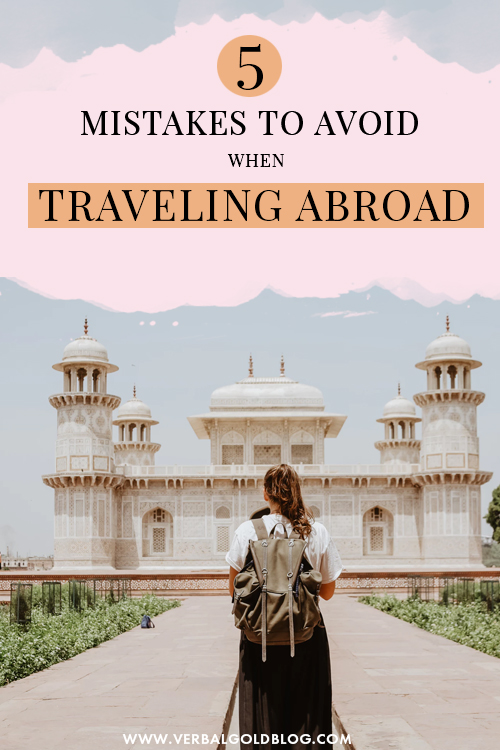
5 Mistakes to Avoid When Traveling Abroad
So many travel articles focus on what you should do when traveling abroad, and what sites you need to see when you travel. But what’s often left out of travel advice articles is the common mistakes you should steer clear of. When you’re planning a trip abroad, check out this list of things to avoid when you travel out of the country, including some common misconceptions about travel.
1. Bringing Traveler’s Checks
Most of us remember the advice to get traveler’s checks at the bank before departing for a foreign country. Today, however, plastic is generally safer — and easier. ATM and credit card usage is far more widespread and acceptable now, while on the other hand traveler’s checks are slowly becoming obsolete. Fewer banks accept them for cash and there are few protections in place if they are lost or stolen. Don’t fall for the outdated advice to carry these checks.
On this note, don’t exchange your cash before you travel, or at the airport, unless you have to — you’re likely to get some of the worst exchange rates. It can be convenient and tempting, but if you can, wait until you arrive, and exchange your cash downtown at a bank for a much better rate. Better yet, just stick to your credit cards for better rates. Just make sure that your cards do not have any foreign transaction fees.
2. Eating at Restaurants Right by Tourist Traps
All of the popular sites are bound to have restaurants nearby, and while this may be convenient, it may not be the most authentic local cuisine or experience. Businesses located right next to popular tourist destinations are used to serving tourists, and not necessarily locals. Why not venture a little farther out and eat like the locals. The prices are bound to be better, and the food more authentic. Check out online reviews or ask at your hotel or hostel for recommendations if you’re unsure where to go. You’ll be much happier with your culinary experience.
Read More: How To Dine Out While Traveling (And Not Break The Bank)
3. Neglecting Traveler’s Insurance
While most people set aside special funds for various travel expenses and emergencies that might arise, many people pass up the opportunity to pay for travel insurance. While it can seem like an annoying extra expense, this insurance can protect you in the event of a medical or natural disaster, among other events. Hopefully, no disaster befalls you on your trip, but if anything happens and you’re caught without this valuable insurance, it can cost thousands in extra fees and expenses.
Read More : How I Could Have Saved $500 On My Last Trip
4. Not Studying Up on Cultural Faux Pas
Before you travel abroad, you should do a little research into the culture of the area you’re traveling to so that you can avoid any conflicts or unintended offensive behaviors. It’s easy to assume that other countries and cultures have the same cultural norms as your home country, but the differences can be as simple as subtleties in hand gestures or tipping etiquette.
A little research can go a long way here towards cultural norms and mutual understanding. For example, tipping in Italy can be seen as an insult, as it’s always already included in the bill. Also, simple hand gestures like “ok,” a thumbs up, or a peace sign can mean very different things in other countries, so make sure you understand the basics of the local culture before traveling, and you’ll fit in much better.
Read More: Global Dining Etiquette
5. Only Staying in Standard Hotels
One of the biggest mistakes travelers can make is neglecting to check out accommodations like hostels and hospitality networks. Many people only know how to book in their comfort zone — with hotels. And while this option is fine, it will end up costing you far more financially, and you’ll be missing out on meeting locals and fellow travelers and sharing in the travel experience.
It’s a misconception that hostels are dirty, unsafe, or crowded. In reality, hostels are clean and welcoming and can save you lots of money. Many have private rooms, so there’s no need to stay in dorm-like conditions. With hospitality networks, you can stay with a local for free. This can save money and allow you to immerse yourself in local culture and make new friends.
Read More: What It’s Really Like To Stay In A Hostel
Avoiding all of these common mistakes while planning your trip abroad can help everything go a little more smoothly. You’ll avoid some major headaches while traveling and enjoy your trip more.




